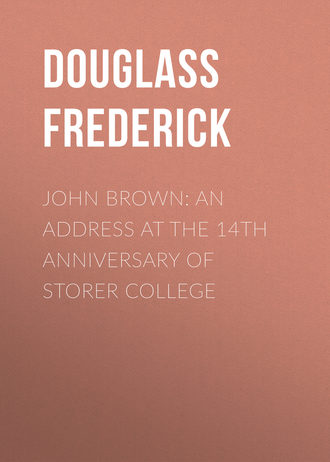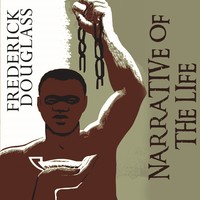 полная версия
полная версияJohn Brown: An Address at the 14th Anniversary of Storer College
If a monument should be erected to the memory of John Brown, as there ought to be, the form and name of Shields Green should have a conspicuous place upon it. It is a remarkable fact, that in this small company of men, but one showed any sign of weakness or regret for what he did or attempted to do. Poor Cook broke down and sought to save his life by representing that he had been deceived, and allured by false promises. But Stephens, Hazlett and Green went to their doom like the heroes they were, without a murmur, without a regret, believing alike in their captain and their cause.
For the disastrous termination of this invasion, several causes have been assigned. It has been said that Capt. Brown found it necessary to strike before he was ready; that men had promised to join him from the North who failed to arrive; that the cowardly negroes did not rally to his support as he expected, but the true cause as stated by himself, contradicts all these theories, and from his statement there is no appeal. Among the questions put to him by Mr. Vallandingham after his capture were the following: "Did you expect a general uprising of the slaves in case of your success?" To this he answered, "No, sir, nor did I wish it. I expected to gather strength from time to time and then to set them free." "Did you expect to hold possession here until then?" Answer, "Well, probably I had quite a different idea. I do not know as I ought to reveal my plans. I am here wounded and a prisoner because I foolishly permitted myself to be so. You overstate your strength when you suppose I could have been taken if I had not allowed it. I was too tardy after commencing the open attack in delaying my movements through Monday night and up to the time of the arrival of government troops. It was all because of my desire to spare the feelings of my prisoners and their families."
But the question is, Did John Brown fail? He certainly did fail to get out of Harper's Ferry before being beaten down by United States soldiers; he did fail to save his own life, and to lead a liberating army into the mountains of Virginia. But he did not go to Harper's Ferry to save his life. The true question is, Did John Brown draw his sword against slavery and thereby lose his life in vain? and to this I answer ten thousand times, No! No man fails, or can fail who so grandly gives himself and all he has to a righteous cause. No man, who in his hour of extremest need, when on his way to meet an ignominious death, could so forget himself as to stop and kiss a little child, one of the hated race for whom he was about to die, could by any possibility fail. Did John Brown fail? Ask Henry A. Wise in whose house less than two years after, a school for the emancipated slaves was taught. Did John Brown fail? Ask James M. Mason, the author of the inhuman fugitive slave bill, who was cooped up in Fort Warren, as a traitor less than two years from the time that he stood over the prostrate body of John Brown. Did John Brown fail? Ask Clement C. Vallandingham, one other of the inquisitorial party; for he too went down in the tremendous whirlpool created by the powerful hand of this bold invader. If John Brown did not end the war that ended slavery, he did at least begin the war that ended slavery. If we look over the dates, places and men, for which this honor is claimed, we shall find that not Carolina, but Virginia – not Fort Sumpter, but Harper's Ferry and the arsenal – not Col. Anderson, but John Brown, began the war that ended American slavery and made this a free Republic. Until this blow was struck, the prospect for freedom was dim, shadowy and uncertain. The irrepressible conflict was one of words, votes and compromises. When John Brown stretched forth his arm the sky was cleared. The time for compromises was gone – the armed hosts of freedom stood face to face over the chasm of a broken Union – and the clash of arms was at hand. The South staked all upon getting possession of the Federal Government, and failing to do that, drew the sword of rebellion and thus made her own, and not Brown's, the lost cause of the century.




